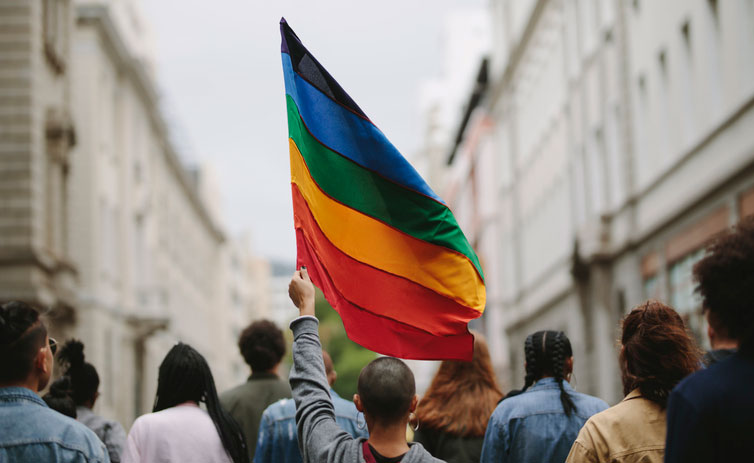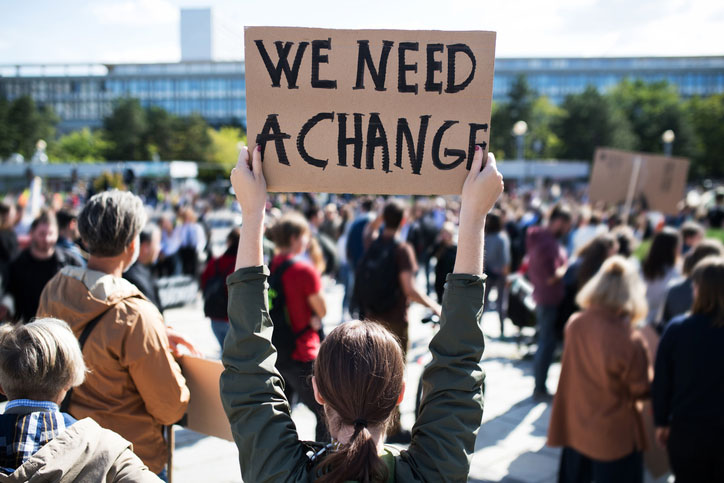Written by Jack Levinson

Those who feel called to the social work profession are motivated by a passion for creating a safer, more compassionate, more equal society for all. Indeed, this vision is central to the rise of social work in the first place, born out of the awareness of the unique difficulties underserved Americans face and the barriers that can keep people from getting on their feet.
As society has advanced and we have grown more aware of the relationship between discrimination and inequality, the social work profession has also evolved to address these issues head-on.
This work has revitalized the social work profession, sparking much-needed conversations to improve its approaches and deliver the most supportive services possible. This has meant raising social workers’ awareness of the impact of bias of all sorts, in issues such as racial injustice, gender discrimination, LGBTQ identities, accessibility, and more. By learning about these issues and refining care methods to account for them, social workers can become the most conscientious professionals they can be, contributing to the positive change they wish to see.


So what are the key social justice issues in social work today, and how has social work advanced our society’s most vital causes? Read on to learn more about the important discussions reinvigorating the world of social work.
The Principles of Diversity and Social Justice in Social Work
From its earliest foundations, the social work profession has been devoted to the broad goal of supporting society’s most disadvantaged. Since social workers attend to issues that have gone neglected by society at large, they have often been firsthand observers of the factors that create inequality. The insights gained from this direct exposure have been powerfully influential, informing present-day strategies to fight inequity at every level.
Social workers can be proud of the impact their work has had for people in need, supporting individuals and families in their day to day lives as well as benefiting whole communities through advocacy efforts.
Because social workers are motivated by a desire to support people in need and understand the roots of injustice in the United States, they have proven to be a receptive and responsible audience when it comes to rectifying bias within the social work field itself. And indeed, even the most engaged and committed social workers would agree that there is always room for growth and improvement.
It might surprise some readers to discover that the discipline of social work is undergoing its own process of responsible revision. However, it should make sense that those who work with disadvantaged communities are continuing to parse out the nuances of prejudice and intolerance as they impact the lives of individuals and families all over the country. As recent years have brought in renewed discussion of the state of American inequality – particularly in relation to identity-related issues such as racism, sexism, ableism, and homophobia – social workers have understand that their own work is deeply invested in these questions. Approaching them head on is therefore a crucial part of ethical social work practice.

How MSW Programs Teach Social Justice
The responsibilities of social workers are delicate, no matter what area of the field they work in. After all, social workers commit their time and energy to helping our most vulnerable, and are therefore tasked with finding avenues to connect with and uplift people who in many cases come from different backgrounds and perspectives.
As a social worker, learning how to connect across differences and provide support without bias is paramount to delivering truly useful services.
In recent years, social workers have become more aware of distressing stories about the adverse impact of bias as it affects clients from marginalized backgrounds, creating instances of harm in situations that were intended to provide help. Because of this, Master of Social Work programs across the state of Texas and the country at large make a major effort to account for the social issues that can come up within social work practice itself.
One important concept that is likely to be introduced in your MSW program is cultural competence. This is an approach to social work practice that aims to prepare incoming social workers for the tremendous diversity of clients you are likely to work with. Combining best practices that provide guidelines for social workers to turn to when navigating difficult situations as well as a larger framework for appreciating cultural difference, it is intended to equip social workers with a kind of toolkit that can help bridge differences across racial, gendered, religious, and other lines.
Cultural competence is now baked into the curriculum at many top MSW programs with the goal of creating more engaged and empathetic services for all people. Though it may seem daunting to add this body of knowledge into an already jam-packed education, those working in the field appreciate the skills and insights cultural competence training gives them, which inform social work practice at all levels, from day to day interactions to overall strategy for delivering services.
Social Justice in the Wake of the COVID-19 Pandemic
The unique exposure social workers have to underserved communities has meant that they often develop unique insights into how broad scale issues impact individuals and families. One such example in recent years emerged out of the COVID-19 pandemic.
As many – including the U.S. Department of Health and Human Services – acknowledged, the impact of COVID-19 on marginalized and underserved communities was greater and more destructive to everyday life. From direct health concerns related to COVID-19 itself to issues related to job loss or lowered pay, communities who were already struggling found themselves in even more precarious positions once pandemic lockdowns began.
Social workers played noble and selfless roles during the pandemic, oftentimes risking their own health to continue to provide services to the people who needed them most. In doing so, they also were witness to the lived impacts of policy decisions related to COVID-19. Seeing the impact of inequality up close was, for many social workers, an eye opening experience that made clear that force majeure (that is, disaster) circumstances hit those who are already struggling the hardest. This has galvanized many social workers to renew their efforts to provide relief to struggling families, whether through their day to day work or through policy advocacy intended to strengthen public supports to help disadvantaged people during times of crisis.
Examples of Social Justice in Social Work
While the social work field is undergoing a period of renewed examination and revision to better account for social justice issues, the discipline has long been engaged with issues of identity-based persecution and injustice. In fact, many people who become social workers do so out of a commitment to advancing one of these particular causes. Because of this, it’s worth taking a look at existing social work programs that address social justice causes.
Social Work for Racial Equality
There are many social work programs invested specifically in the cause of racial justice. Some are devoted to supporting particular communities that are subject to racial discrimination, while others are dedicated to an overall goal of promoting unification and understanding across racial lines. These organizations can be great places to work if fighting racism is one of your primary goals as a social worker.
That said, many organizations that provide important services still have important matters related to race to address, even if their primary objective is seemingly unrelated. This is because our evolving understanding of racial inequality has made clear that discrimination and bias are often present even in circumstances where they are not the overt topic of discussion. This means that students today will learn extensively about racial issues in the social work profession to create better, more effective services for the future.
In short, if you are a social worker in any branch of the field, developing a specifically antiracist approach to your work is imperative to providing quality support to your clients.
In this day and age, we know better than to simply rely on good intentions. Providing racially sensitive care to clients requires training and education, helping individuals in the social work field acknowledge the limitations of their own perspectives and gain an understanding that will allow them to provide unbiased care to anyone who needs it.

LGBT Social Work Programs
LGBTQ+ causes provide another important example of instances in which one’s background (in this case, gender identity and sexual orientation) can lead to circumstances of instability. One important arena in which this can occur for LGBTQ+ individuals is homelessness. Social workers engaged with homeless communities were among the first to recognize how many LGBTQ+ people find themselves displaced due to persecution and intolerance. This has led to specialized services aimed at addressing the unique needs of LGBTQ+ individuals who are living on the streets.
Some who enter the field of social work are specifically interested in LGBT social work, which can relate to the example of homelessness mentioned above or a host of other issues. Social workers working with the LGBT community receive extensive training on how to approach care without judgment or bias to create a safe and welcoming support system for queer individuals, especially LGBT youth. Beyond their direct engagement with clients, these social workers are working to create best practices for all social work organizations so that all can meet LGBT client needs with care and compassion.
Gender Advocacy
Those who are motivated to close the gender gap can find many ways to do so in the social work arena. This can range from involving oneself in services that specifically cater to women’s needs, such as reproductive rights and healthcare, pay disparity, and domestic violence. It can also mean evaluating and redressing issues in agencies that serve the general public, addressing biases directed toward women as well as transgender individuals.
Accessibility and Ableism
As national discourse surrounding ableism and accessibility has risen, the social work profession has done meaningful work to revise and improve its services to make them as available to people with disabilities as they are to those who do not have disabilities.
Every branch of social work has room to improve its services for people with disabilities.
This starts with taking stock of existing practices within social work organizations and evaluating if they are approachable for people with mental or physical incapacities. In some cases, new programs need to be developed, while in others, existing programs simply need to be redesigned to improve accessibility. No matter what type of social work organization you work for, giving compassionate attention to the needs of those with disabilities will improve your services for all.
Juvenile Justice Social Work
Another important arena of the social work profession that requires focused attention is juvenile justice. There are many different types of social workers who work with children and minors, from school social workers to child welfare social workers to those who assist minors in the carceral system. This last instance is one of the most important frontiers of social justice reform.
Social workers who work with incarcerated minors (or recently incarcerated minors) can provide an invaluable source of strength and comfort to individuals who may see little hope for themselves at tragically young ages. By working directly with these young people, social workers can help some of society’s most vulnerable get back on their feet and redeem their lives after experiencing the grave consequences of their errors. Through these experiences, social workers can also play an important role as advocates championing reforms in the juvenile criminal justice system to create a justice system that is more restorative and uplifting than it is punitive and uncompromising.

Taking the Next Steps to Become a Social Worker
Does reading about social justice causes make you feel more motivated than ever to get involved in social work? If so, it’s time to take next steps to get your world-changing career started.
If you don’t yet hold a Master of Social Work degree, this will be your first step toward becoming a social worker. In Texas, you must hold an MSW degree from an accredited institution in order to qualify for social work licensing. To learn more about the top MSW programs in Texas, take a look at our guide.
Once you have received your MSW, you are ready to pursue your social work license. To learn more about social work license requirements and protocols in Texas, visit our guide here.
FAQs
What is social justice in social work?
One could argue that the whole social work field is aimed toward advancing social justice through a multi-pronged approach that addresses small symptoms and large underlying causes simultaneously. Within social work education, social justice has become an important topic, as students’ training begins to include discussions of cultural competence, intersectionality, and other topics that illuminate the biases that still exist within the field, aiming to eradicate them once and for all.
What is economic justice in social work?
Economic justice in social work is the principle of ensuring fair and equitable distribution of resources, opportunities, and wealth to create a more equal society. It involves addressing systemic inequalities and advocating for policies and practices that promote economic well-being and equality for all individuals and communities, particularly those who are marginalized or disadvantaged.
Will I study social justice in my MSW program?
Yes, you most likely will. In this day and age, most MSW programs include cultural competence training, which is designed to help social workers navigate difference with grace and compassion to provide the most supportive services possible.
What degree do I need to become a social worker?
To qualify for a social work license in Texas, one must hold a Master of Social Work degree from an accredited program. It is not possible to obtain social work licensing without an MSW degree.




